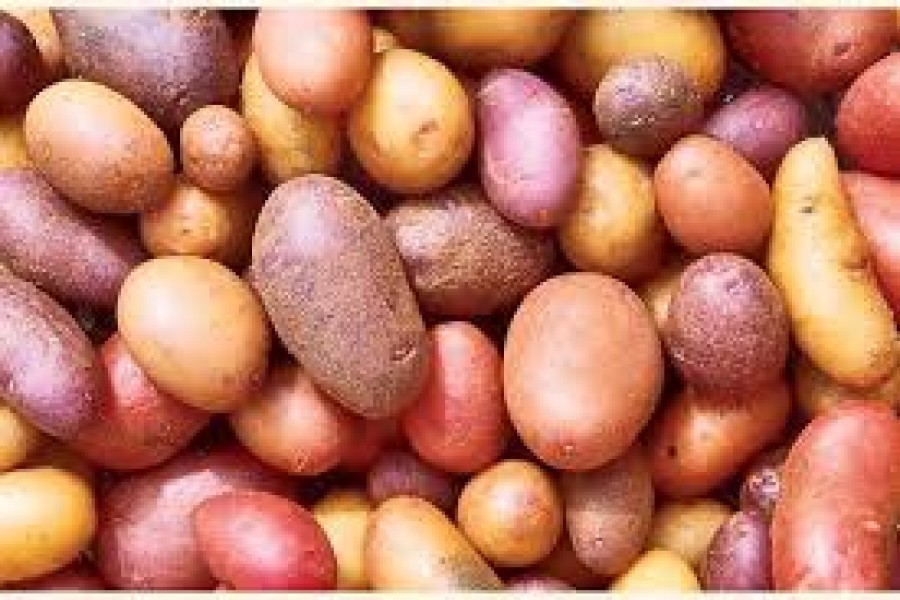The country now produces close to 11 million tonnes of potato annually - a surplus of approximately 4.0 million tonnes. Is it thus at all logical to think that producing more than the domestic demand is fated to be wasted? This, unfortunately, happens to be the case with potato harvest. One of the key reasons is the severe dearth of storage facilities that denies growers from the benefit of bumper harvest. Since this has been a case for the past years, it was likely that the authorities concerned should by now have planned to facilitate overseas marketing.
For some years now, good harvest of potatoes has turned out to be the cause of the growers' misery. While concerned quarters put it on lack of planning, which among others includes dearth of sufficient storage facilities in the vicinities of potato growing areas, the burden of bumper harvest falls squarely on farmers who are extremely ill at ease with their produce in a severely under-priced domestic market.
Not only in case of potatoes, it is often same with some other horticulture products such as tomatoes, leafy vegetables, pineapples etc. The case of potatoes is perhaps more distressing than others.
Increased harvest in the absence of storage facilities has clearly added to the losses of farmers. Stockpiled potatoes in the open due to lack of sufficient storage facilities in the cold storages, carrying hazards at various points to wholesale markets, coupled with unprecedented price slump have caused extreme misery for farmers, especially in the northern region which accounts for 70 per cent of the total production of potatoes in the country. Most of the cold storages in the main potato producing region, Rangpur division, are almost full.
A FE news story, quoting Bangladesh Cold Storage Association (BCSA) says that lower prices and unsold produce at warehouses caused Tk 125.15 billion losses to farmers and cold storage owners last year, and the scenario this year is unlikely to be any different. A total of 0.46 million hectares (460 thousand) of land have been brought under potato farming this season, targeting the production of 10 million tonnes, according to the Department of Agriculture Extension (DAE). Ninety per cent of harvest was reportedly reaped by March 31. The Bangladesh Cold Storage Association (BCSA) has 400 cold storages which together can preserve close to 6.0 million tonnes of potatoes. Cold storages in the northern region account for three-fifths of the total storage capacity. So, there is a substantial gap in potato yield and storage facility.
Why is it so? Potato is a staple in some countries of East Europe. Russia and the now-independent states under the former Soviet Union, the main consumers of potatoes, are largely dependent on imports, although Russia is the third largest producer of potatoes, next to China and India. Bangladesh is the seventh largest producer of potatoes and has been exporting potatoes to some counties, including Russia, in small volumes. Although Russia and the European Union were potential markets for Bangladeshi potatoes, exporting now faces serious snags, particularly to Russia which had put a temporary ban on potatoes from Bangladesh following detection of fungal diseases. Absence of accredited laboratories in Bangladesh for pre-shipment testing in conformity with Russian standards is also a deterrent to keep exports on hold. Exports to the East European markets have been on since 2011. But lack of lab testing facility does pose as a serious barrier to growth of export.
Concerned quarters believe exports could bring a respite to farmers if there is a concerted move to grow potato keeping in view the market-specific choices and standards set by the importing countries, particularly in respect of sanitary and phytosanitary requirements. An organised move to export will, in all probability, generate greater demand for quality produce which would be reflected in prices at growers' level and the country would be able to save huge quantities of potatoes now being wasted.
A government move sometime ago appeared to suggest that the authorities were seriously thinking of a change in the overall potato scenario. The government had formed a seven-member committee comprising officials from the agriculture ministry, commerce ministry, DAE, Bangladesh Agricultural Research Institute and Bangladesh Agriculture Development Corporation to promote potato exports and explore new markets abroad.
Understandably, the main issue of concern is to take care of the surplus stock. Exporting is thus the only way out. But going for export would involve a whole package of activities and reforms-some of which are bound to be cost-intensive, such as -- setting up accredited testing labs, putting in place an adequate number of cold storages.
Given the prospect of exporting and its multiplier effect on the economy and the livelihood of the growers, one has reasons to believe that the government would surely find merit in promoting potato export.


